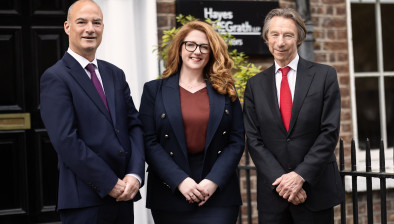High Court: Fitness to Practise report quashed

Andrew McKeown BL
A psychiatric nurse, identified only as T, has successfully challenged a Fitness to Practise report. The matter has been remitted to the Committee.

About this case:
- Citation:[2020] IEHC 492
- Judgment:
- Court:High Court
- Judge:Mr Justice Anthony Barr
T took judicial proceedings against the Chief Executive Officer of The Nursing and Midwifery Board of Ireland (the CEO), the Fitness to Practise Committee of The Nursing and Midwifery Board Of Ireland (the committee) and The Nursing And Midwifery Board Of Ireland (the board).
Background
In 2007, T was employed by the HSE to provide counselling at an outpatients’ mental health facility. From 2007 – 2008, T provided counselling to a woman for an anxiety disorder. In 2008, T moved to another part of the country to take up employment. He continued to have contact with the woman after his therapeutic engagement with her had ceased.
In June 2009, the woman told a counsellor at another mental health facility that she had had a relationship, including having sexual relations, with T between March 2007 and June 2009. The person to whom the statement was made reported the matter to her supervisor, who reported it to the HSE. They carried out an inquiry which resulted in a Trust in Care report in December 2011. That report made a number of findings against him.
That report was furnished to the Board, which set in train an inquiry pursuant to the Nurses Act 1985 s.38 (since repealed and replaced by the Nurses and Midwives Act 2011) into alleged professional misconduct and alleged unfitness to engage in the practise of nursing.
The Committee found him guilty of professional misconduct and went on to make a recommendation that the appropriate sanction which should be imposed by the Board was the sanction of erasure.
High Court
T sought certiorari of the report issued by the Committee in October 2018.
T did not object to the findings of professional misconduct, which were based upon certain admissions that he made before the committee. The nurse admitted inter alia that he “breached the parameters of a normal therapeutic relationship” with the patient, and that he failed to regard the fact that she was an emotionally or psychologically vulnerable person.
However, he objected to the report, and the recommendation of erasure, due to the fact that certain documents were placed before the committee which T maintained were in breach of an express agreement he had with the CEO as to what evidence would be admitted before the committee.
He claimed the Committee breached his constitutional right to fair procedures by having regard to challenged statements without him being able to challenge the makers of the statements. Counsel for T submitted that he had not had an opportunity to challenge, by way of cross-examination, highly prejudicial assertions that had been made against him in the challenged witness statements. In this regard, counsel relied on the decision of Chief Justice Keane in Borges v the Fitness to Practise Committee of the Medical Council [2004] 1 IR 103, and he also referred to RAS Medical Limited v Royal College of Surgeons in Ireland [2019] IESC 4, where a dispute arose as to the evidential status of documents that had been provided in discovery.
T also alleged that Committee’s report was bad in law, because it did not deal with his offer to give an irrevocable undertaking not to take his name off the inactive register of nurses, in lieu of sanction. T maintained that the Committee did not give any reasons why that offer had been rejected.
Counsel for T, citing State (Creedon) v Criminal Injuries Compensation Tribunal [1988] IR 51 and McAllister v Minister for Justice, Equality and Law Reform [2008] 4 IR 35, submitted that there was a duty on judicial and quasi-judicial tribunals to give reasons for the decisions which they made. Citing Mr Justice Peter Kelly’s judgment in Prenderville v Medical Council & Ors. [2008] 3 IR 122, counsel said a similar obligation exists in medical inquiries. Counsel also referred to Mallak v Minister for Justice, Equality and Law Reform [2012] 3 IR 297 and Brennan v An Bord Altranais [2010] IEHC 193.
It was submitted that having read and considered that material, the Committee and the Board had been tainted and could not be relied upon to give a fair and unbiased decision in the matter. Counsel characterised the situation by saying that “the apple of knowledge cannot be uneaten”.
In this regard, counsel referred to the decision of Lord Justice Robert Carnwath in the English Court of Appeal in R (on the application of Mahfouz) v the Professional Conduct Committee of the General Medical Council [2004] EWCA Civ 233, where the court held that the committee would have to stand down due to having had sight of prejudicial newspaper reports concerning the applicant.
Counsel for the Board, citing Phillips v The Medical Council [1991] 2 IR 115, suggested that the court should have regard to the Board’s primary function, being a statutory body entrusted with important statutory functions to be performed in the public interest. Counsel referred to the judgment of Mr Justice Diarmuid O’Donovan in Perez v An Bord Altranais [2005] 4 IR 298, where he emphasised the paramount importance of the public interest, as well as to the private interests of the parties before it.
The Board’s barrister, citing the judgment of Mr Justice Declan Costello in Philips, and that of Ms Justice Úna Ní Raifeartaigh in Dowling v An Bord Altranais [2017] IEHC 62, and of Mr Justice Brian Ousley in the English High Court in R (on the application of Squier) v The General Medical Council [2015] EWHC 299, said that it was well established in law that where there were proceedings that were ongoing before a specialist tribunal, the court should exercise curial deference towards such bodies and should be slow to interfere with decisions made by them in the course of the proceedings.
Counsel also referred to the decision of Mr Justice Richard Humphreys in North East Pylon Pressure Campaign Limited v An Bord Pleanála [2016] IEHC 300, where the court made observations in relation to the undesirability of the court interfering in ongoing disciplinary or administrative processes by way of judicial review.
Mr Justice Anthony Barr found that the CEO, having expressly agreed to the exclusion of documents, could not then allow these to be placed before the committee. The committee should have addressed T’s offer of undertaking never to seek to have his name removed from the inactive register.
Conclusion
The report was quashed, and the matter referred back to the Fitness to Practise Committee.








